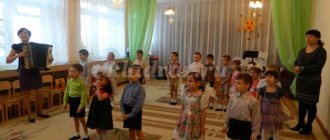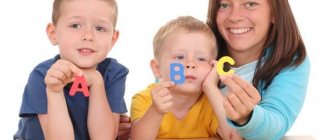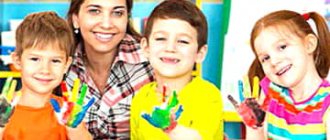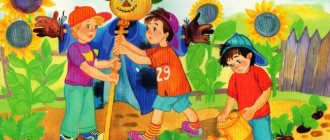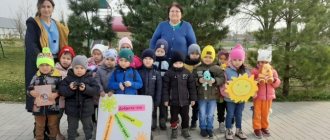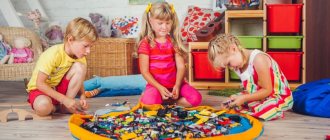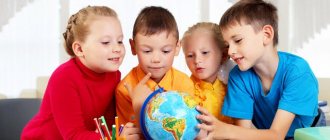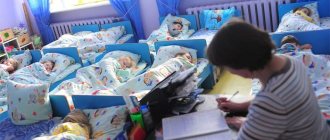When does a child need help from a psychologist?
In most cases, parents are embarrassed to contact a psychologist when they notice problems with their children. Excuses are used to reassure ourselves - “it’s all age related” or “the child has such a character.” However, if the problem is not addressed, it is unlikely to go away on its own. This is why you should make an appointment with a child psychologist - he will help you understand the problem and correct the child’s behavior as gently as possible. The sooner parents seek help from a doctor, the better it will be for the little patient.
So in what cases is it necessary to consult a child psychologist? You should make an appointment with a doctor if your child has:
- disorders of psychological development, speech;
- anxiety, panic attacks;
- depressive thoughts and states;
- neurotic reactions;
- documented eating disorders (obesity, anorexia nervosa or bulimia);
- diseases of a psychosomatic nature: neurodermatitis, gastrointestinal problems, neurogenic bladder, other psychogenic pain with different localization;
- psychological and behavioral deviations associated with sexual development and orientation.
Conscious parents also visit a child psychologist to determine the child’s readiness to attend school or kindergarten. However, during diagnosis, a number of other problems often emerge that parents did not pay attention to. Many families, in the process of visiting a psychologist, were able to help their child solve problems of decreased motivation to study, correct aggressive behavior, and get rid of anxiety and nightmares.
Another popular reason for turning to a child psychologist in your city (Moscow or any other) is increased physical activity or, on the contrary, isolation and unsociability, difficulties with adaptation in a team.
Junior group. Early childhood, nursery. Children 1-4 years old
Summary of a lesson on the development of the emotional sphere in young children “Visit the autumn forest” Goal: development of the emotional sphere of young children Objectives: develop positive emotions and speech; consolidate knowledge of primary colors (red, green, yellow)
; continue to teach children how to hold a brush and paint correctly; Material: soft toy...
Summary of a complex lesson with elements of psychological training for children 1.5–2 years old “Feelings are more important than words” MDOU “Kindergarten No. 157”
Summary of a complex lesson with elements of psychological training for children 1.5–2 years old. “Feelings are more important than words”
Prepared by: teacher-
psychologist Mikhailova A.L. Yaroslavl 2022 “Feelings are more important than words”
Equipment. Boxes Masha and the Bear, hoop, ribbons,…
How are individual psychologist sessions with children conducted?
The first stage of working with a child is diagnosis. It is carried out in a game mode - with the help of special tests, games and drawings, the doctor compiles a psychological profile of the child, identifies developmental features, obvious and hidden psychological deviations. After diagnosis and identification of deficiencies, a treatment program is drawn up. At this stage, work is also carried out with adults: often, in order to eliminate a child’s problem, mom and dad and grandparents must change their behavior.
The price of individual sessions with a psychologist will not seem high if you know what the child will receive as a result: healthy self-esteem, self-confidence, the ability to overcome fears and boldly move through life. A person’s psychological attitude is always formed in childhood - therefore it is very important that at this age the child resolves the main psychological conflicts and is able to fully develop further. The right psychological attitude will help a young man in the future not to succumb to despondency and despair, not to lose heart when problems arise, and to easily create connections with other people.
It is very important to contact a psychologist as early as possible, before problems sprout like weeds and turn into complexes. Make an appointment at the Center for Neurology and Pediatrics, and our specialists will do everything to ensure that your child has a healthy psyche!
What deviations can individual lessons help correct?
Classes with a child psychologist help get rid of the following problems:
- Emotional and behavioral deviations: unmotivated mood swings, aggressiveness, anxiety, increased activity, isolation, hysteria, tearfulness, low self-esteem, misunderstanding of parents or other close relatives.
- Deviations in the field of learning: negative attitude towards learning, unsuccessful adaptation in a group of peers, problems in communicating with others or teachers.
- Insomnia or sleep disorders: anxiety, inability to fall asleep alone, frequent nightmares.
- Consequences of psychological trauma: psychosomatic disorders, severe reaction to parental divorce, death of a loved one or beloved pet.
- Physical symptoms of nervous disorders: incontinence, tics, stuttering.
It is worth noting that the recommendations of the teaching staff of a school or kindergarten are not a reason to attend classes with a psychologist for children. It is important for young parents to understand this.
MAGAZINE Preschooler.RF
Summary of a diagnostic game lesson with children of senior preschool age “Quest game “In Search of the Key”Compiled by: Teacher-psychologist Natalya Nikolaevna Vishnyakova, Nadym, 2022.
Place of work: Municipal preschool educational institution "Kindergarten "Scarlet Flower" in Nadym"
Target
- to promote the development of the imagination of preschoolers, using modern non-traditional methods and techniques, in particular, through the introduction of game quest technology into the educational process, which promotes the formation of independent thinking in children and the development of cognitive activity.
Tasks:
- encourage children to set goals and become independent in all types of activities and thinking;
- contribute to the development of auditory and visual perception, attention, memory, general and fine motor skills, the ability to navigate on a plane, search activity, and the desire for novelty;
- improve the ability to cooperate, cultivate a friendly attitude towards others;
Methods and techniques:
- practical (games “The fourth odd one” , “Draw a figure” , “Remember the object” , “Collect a picture” )
- visual (task cards, emoticons)
- verbal (questions, discussion, children's stories).
Materials and equipment: ball, plan map, set of game cards “4-odd” , cards for the exercise “remember the object” (according to the number of children), blank sheets of paper (according to the number of children), pencils, puzzle, key, emoticons.
Planned results:
- Development of cognitive functions, ability to cooperate with each other
- transfer of emotions.
Types of children's activities: gaming, communication.
Class.
Organizational Children enter the hall and greet the guests. They greet each other with the words “Good afternoon... (child’s name), I’m glad to see you .
Guys, I lost the key to my office. What do you think should be done? (Children's answers: - take a spare one; call the Ministry of Emergency Situations; find where you left it). To find the clue, we need to complete the task. We will act according to plan.
Main part
1. "Game 4 is extra".
I invite the children to take a card, they need to find an extra item and explain why it is extra.
Well done. That's right, I think this will be part of the hint for you.
After the task, we find a piece of the puzzle in the envelope.
Children look at the plan and determine where they can get the next clue.
2. Working at a desk.
Exercise “Draw a figure” .
“Be careful, draw all the shapes”.
Sit down at the table, take a pencil. Draw the figures as I say.
Draw a circle in the center of the sheet.
Draw a square in the upper left corner.
Draw a triangle in the lower left corner...
Draw a rectangle in the upper right corner.
Draw an oval in the lower right corner.
Well done, check if you did everything correctly.
(P. p. shows the correct card, children compare with the model.)
3. Exercise “Remember the subject” .
P.p. next task. It's time for you to test your child's memory.
Now I will name a few items. Listen carefully and try to remember as many words as possible: candy, butterfly, turtle, frog, watering can, elephant, snail, car. Now circle the items you remember.
Exchange leaves, take a blue pencil, and check if your friend did everything correctly. (P.p. reads the words, the children check, circle the item that was missed. They determine whether the task was completed correctly. After the task, we find the second part of the puzzle in the envelope. The children look at the plan, determine where they can get the next clue.
4. Game “Floor, nose, ceiling” .
Next task for attention. I think we should get some rest. And now it's time for you kids to play.
Stand in a cheerful circle 1, 2, 3, 4, 5 We begin to play You guys, don’t yawn And repeat after me
Do what I say, not what I show.
After the task, we find the third part of the puzzle in the envelope. Children look at the plan and determine where they can get the next clue.
5. Game “Part and Whole” .
We go up to the 3rd floor, there is a piece of the puzzle on the table.
Look, you and I have pieces of the puzzle and there are puzzles on the table, let’s put them together and see, maybe this will be a clue to where I lost my keys. I invite the children to assemble all the parts. Children collect puzzles.
The result is a picture, the children must conclude what happened (chest), where did you see such an object? (near the office).
I suggest the children find it. Children find the object and take out the key. We open the office.
6. Reflection. Conversation “My mood”
P.p. I suggest you sit in a circle. I ask the children what feelings they experienced when they helped look for the key and when they found it. (Surprise, desire to help, joy), What is your mood now?
I invite children to choose an emoticon that matches their mood.
Guys, you helped me find the key because you were friendly, completed the tasks, and did not leave me in trouble.
P.p. sums it up and asks what was difficult?
What was easy? What did you like most? Evaluates each child. Thanks for your help.
GCD duration: 25-27 minutes.
Bibliography:
- Sharokhina V.L. “Correctional and developmental classes in the senior group” - M: Knigolyub 2004.
- Kurazheva N. Yu., Baraeva N. V., Tuzasva A. S., Kozlova I. L. 3 “Seven-flowered flower” . Program for the intellectual, emotional and volitional development of children 5 - 6 years old. - St. Petersburg: Speech; M.: Sfera, 2011. - 218 p.
- Svetlanova I.A. “Psychological games for children” - Rostov-n/D: “Phoenix” , 2015.
“Remember” task
It's time for you to test your kids' memory!
Listen carefully and try to remember as many words as possible.
An adult names several objects:
candy, butterfly, turtle, frog, watering can, elephant, snail, car.
Now circle only those objects that were named.
Exercise “Draw a figure” .
“Be careful, draw all the shapes”.
Sit down at the table, take a pencil. Draw the figures as I say.
Draw a circle in the center of the sheet.
Draw a square in the upper left corner.
Draw a triangle in the lower left corner...
Draw a rectangle in the upper right corner.
Draw an oval in the lower right corner.
Well done, check if you did everything correctly.
P.p. shows the correct card, children compare with the sample
| Next > |
